Will Britain fall into a recession this summer?
Spiralling cost of living comes after the Russian invasion of Ukraine

Concerns are growing that Britain might slip into a recession amid slow post-lockdown growth and squeezed household incomes.
Economists have warned that the “double blow” of slowing growth and sky-rocketing living costs after the Russian invasion of Ukraine could see a fall in gross domestic product (GDP) for two consecutive quarters, “the definition of a recession”, reported The Guardian.
Thanks to “weaker than expected” growth in February, and inflation reaching its “highest levels since 1992” in April, forecasters have predicted that UK GDP is “on track” to grow by about 1% in the first quarter of 2022, “before slipping into reverse this summer”, said the paper. The economy is likely to shrink in the second quarter, before growing by just 0.2% in the third quarter, according to James Smith, an economist at the Dutch bank ING.
Subscribe to The Week
Escape your echo chamber. Get the facts behind the news, plus analysis from multiple perspectives.

Sign up for The Week's Free Newsletters
From our morning news briefing to a weekly Good News Newsletter, get the best of The Week delivered directly to your inbox.
From our morning news briefing to a weekly Good News Newsletter, get the best of The Week delivered directly to your inbox.
“It’ll be pretty close to a technical recession,” Smith told the paper. “Even if one is avoided then we’ll still only see fairly unexciting growth numbers.”
Slowest growth in G7
Despite assertions otherwise from Boris Johnson, the UK is set to be the slowest-growing G7 economy, as both the cost-of-living crisis and Rishi Sunak’s widely criticised tax increases “slow economic activity to a crawl”, reported the Financial Times (FT).
Just last month Johnson told the Conservative Party conference that due to the country’s speedy vaccination programme, the UK was set to have “the fastest growing economy in the G7”. But a new International Monetary Fund forecast has tipped the economies of the other six G7 countries – US, Japan, Germany, France, Italy and Canada – to grow faster. And economists speaking to the FT have pointed out that the UK’s economic performance compared to the rest of the G7 has simply been “average”.
Britain’s economy is set to increase by just 1.2% in 2023 – and inflation is tipped to be “higher than every other G7 member and slower to return to its 2% target”, said the paper.
The UK is also at risk of entering into a “prolonged” period of so-called “stagflation” – defined as a period of slow growth in gross domestic product coupled to high inflation – thanks to surging consumer prices coupled with sluggish economic growth, reported Valentina Romei in the FT.
“The spectre of stagflation stalks the UK economy,” said Ed Monk, an associate director at the investment management company Fidelity International.
Protecting your money in a recession
While the lingering effects of Covid on the economy means that “persistent growth is not a guarantee”, The Telegraph contended that a true recession is “unlikely”. According to the Office for National Statistics, the UK’s GDP shrank by 0.2% in December, but its GDP for the final three months of the year was 1% higher than the previous quarter.
However, in the event of a recession, the paper advises consumers to “pay down any expensive debt that you may have, such as credit cards”. Those with multiple debts should “address the borrowing with the highest interest rate first, and then move on to the next”. It also advises building an emergency cash fund to help protect against unexpected bills or periods of unemployment.
Households can lean on lockdown savings
The savings many households accumulated over lockdowns may “cushion the blow of rising costs and falling real wages”, said John Stepek in MoneyWeek.
It also means that “a slide in incomes doesn’t have to mean a corresponding slide in spending”, he added.
But the biggest “unknown” in the economic equation is energy prices. If they come down, rather than staying where they are – or rise higher – “it would make a big difference both to inflation and to household budgets”.
Nevertheless, costs are likely to rise faster than incomes, returns on investments and cash savings, meaning that consumers will “have to be much more attentive” to their investments and personal finances in 2022 – but a recession is “by no means baked in just yet”, Stepek concluded.
Create an account with the same email registered to your subscription to unlock access.
Sign up for Today's Best Articles in your inbox
A free daily email with the biggest news stories of the day – and the best features from TheWeek.com
Sorcha Bradley is a writer at The Week and a regular on “The Week Unwrapped” podcast. She worked at The Week magazine for a year and a half before taking up her current role with the digital team, where she mostly covers UK current affairs and politics. Before joining The Week, Sorcha worked at slow-news start-up Tortoise Media. She has also written for Sky News, The Sunday Times, the London Evening Standard and Grazia magazine, among other publications. She has a master’s in newspaper journalism from City, University of London, where she specialised in political journalism.
-
 Why is Bluey such a cultural phenomenon?
Why is Bluey such a cultural phenomenon?In the Spotlight Kids are obsessed — but parents get just as much out of the show, if not more
By Anya Jaremko-Greenwold, The Week US Published
-
 Is it actually economical to fly basic economy?
Is it actually economical to fly basic economy?The Explainer Airlines have placed so many restrictions on basic economy, you may wonder if it's even worth the savings anymore
By Becca Stanek, The Week US Published
-
 So bad, so good: the best worst movies
So bad, so good: the best worst moviesThe Week Recommends These films are as enjoyable as they are terrible
By Anya Jaremko-Greenwold, The Week US Published
-
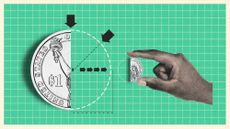 Why are dollar stores a microcosm for America's shrinkflation problem?
Why are dollar stores a microcosm for America's shrinkflation problem?Today's Big Question Recent reports have tapped dollar stores as the top offenders of shrinkflation — even beyond grocery stores
By Justin Klawans, The Week US Published
-
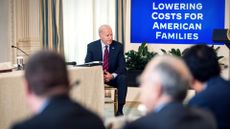 Feds cap credit card late fees at $8
Feds cap credit card late fees at $8speed read The Consumer Financial Protection Bureau finalized a rule to save households an estimated $10 billion a year
By Peter Weber, The Week US Published
-
 Nigeria's economic woes: what went wrong for African nation
Nigeria's economic woes: what went wrong for African nationUnder the radar President Tinubu is struggling to tackle soaring inflation after 'shock therapy' of ending fuel subsidies
By Richard Windsor, The Week UK Published
-
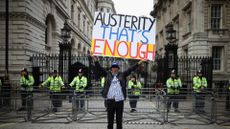 New austerity: can public services take any more cuts?
New austerity: can public services take any more cuts?Today's Big Question Some government departments already 'in last chance saloon', say unions, as Conservative tax-cutting plans 'hang in the balance'
By The Week UK Published
-
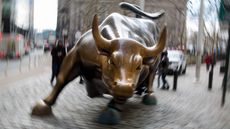 How the world economy learned to live with the drama
How the world economy learned to live with the dramaUnder the Radar As economists predict a 'soft landing' after recent crises, is the global economy now 'oblivious to the new world disorder'?
By Elliott Goat, The Week UK Published
-
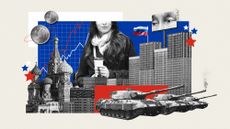 Has life in Russia regressed since the Ukraine invasion?
Has life in Russia regressed since the Ukraine invasion?Today's big question The 'war economy' has defied Western sanctions as ordinary citizens rally round the regime
By Elliott Goat, The Week UK Published
-
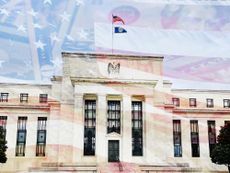 Could Fed interest rate cuts tip the election?
Could Fed interest rate cuts tip the election?Talking Point The central bank could make interest rate cuts during a campaign focused on the economy
By Harold Maass, The Week US Published
-
 How long can consumers keep the economy humming?
How long can consumers keep the economy humming?Talking Point Consumers boosted growth, defying recession warnings. The question is whether 2024 will be different.
By Harold Maass, The Week US Published